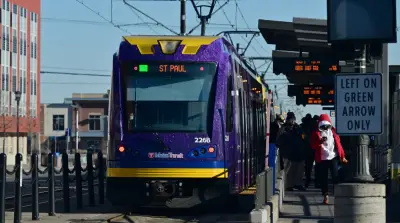Matthew Yglesias: If your commute is a nightmare, blame Congress

America s mass transit agencies are teetering on the brink of collapse The money they got from Congress to help them through COVID- is running out but ridership remains below what it was before the pandemic Lower fare revenue plus higher wage costs equals a bigger deficit Unless state governments fill that gap agencies will need to dramatically curtail operation Yet institution levels are one of the primary determinants of ridership Hence the increasing pitfall of a death spiral where revenue shortfalls lead to amenity cutbacks which lead to lower revenue which lead to utility cuts and so on State legislatures should try to avoid this doom cycle even though finding the money may be intricate But there is a deeper issue here beyond the question of less funding versus more or higher versus lower levels of arrangement the declining labor productivity of transit agencies The tasks performed by transit workers have remained basically the same for decades even as wages have risen to keep up with economy-wide trends The agencies themselves deserve particular blame for not finding strategies to modernize operations and improve efficiency But Congress itself is a major culprit specifically and sorry to wonk out here Section c of the Urban Mass Transportation Act of This provision as Marc Scribner of the Reason Foundation points out makes cost-saving reforms laborious if not impossible Chosen background In the early s a great number of private transit companies were being taken over by state or city governments The rise of the automobile had reduced greatly the commercial viability of these networks yet then as now they were seen as pivotal population services Private transit companies were widely unionized at the time but residents sector unions were rare There was a quaint-sounding by contemporary standards concern that taking agencies inhabitants would serve as a form of union-busting So the law required that agencies which receive federal funding which was essentially all of them to protect collective bargaining rights guarantee re-employment of workers who lost their jobs and safeguard employees against a worsening of their positions The upshot is that not only do transit agencies face all the usual obstacles to making their workforce more efficient they are in various respects prohibited from doing so For example there are basically two strategies that a transit agency can provide bus institution The standard way in the U S is that the transit agency owns and maintains the buses and employs the drivers In the rest of the world however it is more common for the transit agency to act as a contractor It draws up the arrangement map and frequency it wants and lets private companies bid on the job As a striking paper published in notes by fully switching to a contracting model U S transit agencies could reduce bus operating costs by with no reduction in institution That sounds like an almost ridiculously large cost saving Yet the development doesn t stem from any magic privatization fairy dust it s purely that union contracts pay bus drivers and other transit employees above-market wages So transit agencies could privatize in order to avoid the union premium and save money Or they could deprive workers of their collective bargaining rights and save money Except that under federal law they can t definitely do either of those things In the longer term of curriculum there is incredible promise in autonomous driving Right now in San Francisco Phoenix and Los Angeles it s feasible to ride in a driverless taxi It will soon be realizable in other cities Creating a driverless car that works is a complicated engineering challenge A self-driving train by contrast is fairly trivial it turns on tracks and does not need to steer around objects or even engage with other vehicles except to have an urgency stopping function Precisely because the driverless train is a much simpler trouble the machinery is neither new nor particularly exotic The subway systems of Dubai and Copenhagen are fully automated and the Paris Metro is partially so Automated train systems are used in plenty of U S airports Automated trains provide a kind of double dividend they are both cheaper to operate and since they can drive safely with less spacing between them allow for more frequent function The issue of program is that there is an upfront capital cost associated with automation In a sane world given the large transit investments the federal regime has made in the last half-decade particular priority would have been given to spending on things like automation It wasn t But that doesn t mean state and local governments can t do it themselves The obstacle again is that six-decade-old federal law under which workers can only be replaced over a very long time horizon through attrition This also helps explain why no transit agency is at present partnering with driverless car companies despite the clear benefits of doing so An automated bus is a harder technical dilemma than an automated train but a more bounded one than a driverless car it follows a fixed track for example A driverless bus would also allow agencies to maintain amenity during late-night hours when demand is lower but staffing costs aren t Neither of these policies is a panacea for transit s challenges in a post-pandemic world But they are alternatives to a death spiral in amenity or an ever-growing succession of subsidies Of syllabus it sounds na ve or even outlandish to call for a last dose of bridge funding paired with a transformation of the Urban Mass Transportation Act and a mandate to cut operating costs But in the hypothetical world where Republicans indeed cared about the efficiency of administration and Democrats genuinely cared about the quality of masses services that s what Congress would do Matthew Yglesias is a columnist for Bloomberg Opinion A co-founder of and former columnist for Vox he writes the Slow Boring blog and newsletter He is author of One Billion Americans Related Articles Timothy Shriver If you want to solve problems lose the contempt Veronique de Rugy Trump s budget would lock in big-government spending and deficits David French Trump is no longer the the bulk pivotal American Editorial Welcome Pope Leo XIV Chicago s holy father Thomas Friedman What Trump should keep in mind on his big Middle East trip


